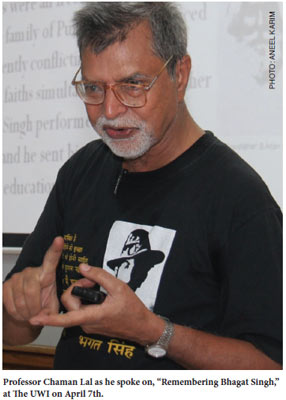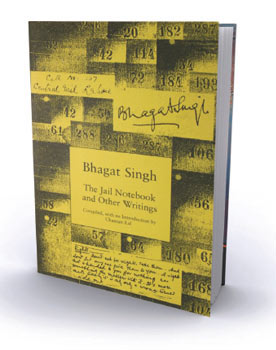 |
 |
 |
|
April 2011
|
A liberated spirit: Visiting Indian professor seeks region’s revolutionariesBy Vaneisa Baksh
It underlies everything he does, this existential appetite – his advice to students is that “education is to get to know yourself, your society, your country and also the meaning of life.” It’s not about passing exams, he says. Soon, “you have to start choosing, you have to take your own decisions.” Professor Chaman Lal holds a MA degree in Hindi and Punjabi from Panjab University, and has an MA in linguistics and a Ph.D in Hindi from Jawaharlal Nehru University New Delhi. He is visiting Professor in Hindi at the Centre for Language Learning (CLL), a position slightly to the right of his literature background, which has a decidedly revolutionary slant. His family was poor and university was a distant dream. His father thought he should follow him as a shopkeeper and to avoid that fate he took to the public library. There, he discovered the 1936 novel Godan by the celebrated writer, Munshi Premchand. He read it in one day, and it “liberated me” he says. Around 17, struggling to deal with the doors poverty was slamming shut, he began reading of the revolutionary movements in India and came across the story of Bhagat Singh, which would eventually become the centre of his research. “The concept of freedom gripped my mind,” he says. “We must value freedom more than anything else; more than facilities, more than comforts…” So his literary interests have followed freedom fighters, revolutionaries…forces of liberation, and it was the idea of researching names like CLR James, Che Guevara and Hugo Chavez that enticed him to accept the invitation to come to Trinidad. He’s been here since October 25, on a one-year visit arranged through one of the outreach initiatives of the International Office. Almost half-way through his Trinidad sojourn by now, Professor Lal has formed some impressions of Trinidad and its cultural similarities and differences with India. Writing in his blog, he records his impressions of Carnival and naively comments that he was impressed that men do not seem to harass women, despite the circumstances, in the way they would, say on a crowded bus in India. “Only when I walked through some festivities, I realised the true significance of these events. First activity I saw was launching of festivities in the University itself by the Guild of Students. It was mini costume bands display for few hours on stage and in walk. Initially it was little perplexing for me to see winning – pronounced wine-ing, in which woman rub her buttocks with groins of other women in dancing postures. This was considered indecent by British colonial regime and they had banned it, but that led to making this item as the form of rebellion against colonial repression. Over the period, winning has got little perverted also, as now men and women both do winning with each other or men with men also and side winning also in clumsy manner, sometimes falling on the ground in process. Further they took it to doing it in frontal manner, making it look like sexual gesture of union. Also they do it buttock to buttock now. But this is done in presence of thousands of people and does not cause any ripple here. And this is done in public just in the days of Carnival, as certain liberties are taken by men and women during Holi in India.”
He’s found that there are many differences between students from Jawaharlal Nehru University, where he has spent decades, and UWI students. The students and teachers at JNU have much closer relationships than he has found at UWI (students can drop in at the houses of lecturers freely).He mentions that there is no culture of drinking on the JNU campus, and that education is very heavily subsidized. One of the things that seemed to have struck him very forcibly was the approach to work and study. “Indians work for 12, 14, 16 hours a day,” he says, adding that they also study the same length of time. Here, he says with a rather perplexed look, “they only study for four, five, hours,” and they are “very rigid” about their work times (meaning they don’t stay late). He surmises that if people love what they are doing, it never seems too much. “In any society, particularly capitalist ones, people do not get the work of their choice, they are forced to work, so their productivity is never as high. My thing was to acquire a life which I like mentally and literature gave me that space.” There is a line attributed to Premchand, the writer who wooed him, that seems to capture the life he has led: “Idealism has to be there even though it should not militate against realism and naturalness.” Professor Chaman Lal’s work Professor Chaman Lal has written many books on Bhagat Singh, in several languages. Apart from his writings on Singh, he also delivered 30 lectures in India and abroad during the Bhagat Singh centenary. Some of his publications include:
|

 “Books gave me a sense of the quest for the meaning of life,” he says, citing the Russians: Dostoyevsky, Tolstoy, Chekhov, Gorki, Turgenev, Gogol, Pushkin, “they put it in your head immediately: what is the meaning of life?”
“Books gave me a sense of the quest for the meaning of life,” he says, citing the Russians: Dostoyevsky, Tolstoy, Chekhov, Gorki, Turgenev, Gogol, Pushkin, “they put it in your head immediately: what is the meaning of life?” He finds this “region” to be heavily influenced by the American system of education, which he thinks is highly reliant on technology: “here it is more professionally competent, so you will have powerpoint presentations that look impressive but are not necessarily substantial.”
He finds this “region” to be heavily influenced by the American system of education, which he thinks is highly reliant on technology: “here it is more professionally competent, so you will have powerpoint presentations that look impressive but are not necessarily substantial.”